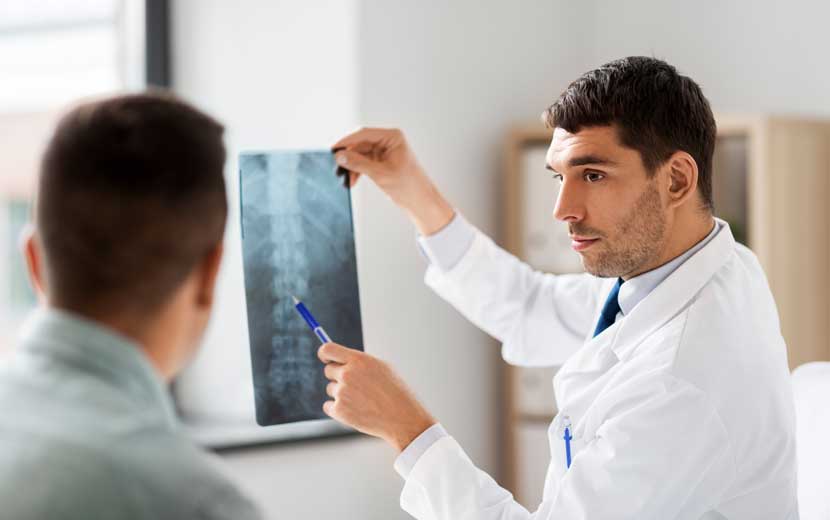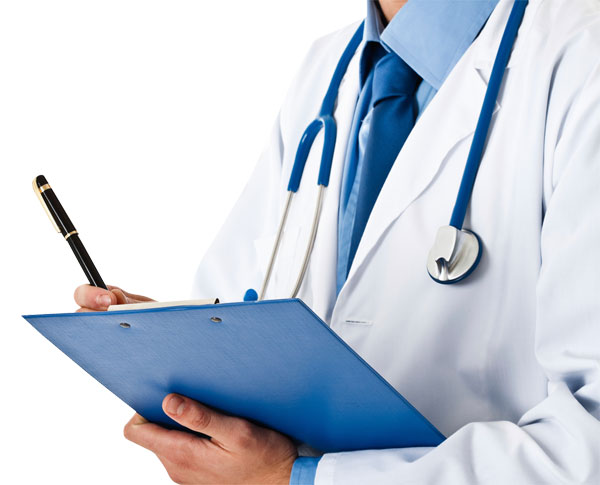Bulging Disc & Herniated Disc Treatment Near Me

What is a Herniated Disc/ Bulging Disc?
A herniated disc is an injury to the vertebral column or spine. The vertebral column consists of 24 separate bones in adults, called vertebrae. These bones protect the spinal cord and offer structural support for the body. Discs in between the bones, known as intervertebral discs, act as cushions absorbing the physical stress and shock that results from various movements.
Have you been diagnosed with a Herniated Disc/ Disc Bulge? Find the best Herniated Disc Specialist near you for treatment & quick recovery from a bulging disc. Our no fault bulging disc treatment clinic is closely located near you. For a quick appointment, just open the doctor’s profile & fill up the Online Appointment form.
Each disc contains a tough exterior outer band known as the annulus fibrosus. The nucleus pulposus is a gel-like substance at the center of the annulus fibrosus. This gel-like substance is similar in consistency to jelly.
A herniated disc occurs when the annulus fibrosus tears or ruptures resulting in the nucleus pulposus oozing out of the intervertebral disc. This condition is commonly treated by many different medical providers, depending on your symptoms and the extent of your disability, including neurologists, orthopedists, chiropractors, pain management doctors, and physical therapists.
Have you been diagnosed with a Herniated Disc & Looking for top-rated bulging disc specialist near you? Learn more about the benefits of orthopedic treatment & check the list of the top nearby Orthopedic disk pain doctors. We have brought to you the best Herniated Disc Pain Doctors near you for treatment & quick recovery.
AccidentDoctors911 has an array of herniated disc doctors who can treat bulging & herniated disks effectively. Our doctors has clinics near you in Bronx, Brooklyn, Manhattan, Hudson, Orlando, Bergen, New Jersey, Queens, and almost all over the New York & New Jersey.
Why Can a Herniated Disc Be Painful?
A herniated disc can protrude to the point that it presses on a spinal nerve, causing a condition known as radiculopathy. This condition refers to pain that “shoots” down the leg or arm, depending on the location of the herniation. It can cause weakness, numbness, and/or tingling in the arms, hands, legs, and feet.
Pain associated with a herniated disc may be due to chemical irritation that results from direct contact of the nucleus pulposus with adjacent spinal nerves. This contact happens when the nucleus pulposus oozes from the torn annulus. The annulus fibrosis contains pain fibers, so tearing of the annulus may trigger pain as well.
Herniated discs can also cause loss of sensation and motor function in the extremity affected. Persistent neurological impairment can lead to motor and sensory deficits, weakness, and abnormal reflexes. Spinal cord dysfunction may result when the spinal cord is compressed.
What are the Causes of Disc Herniation?
The wear and tear process, often associated with aging, can make a patient more susceptible to disc herniation & bulging discs. As we age, discs are not as flexible as they once were, and are more prone to tearing.
Traumatic injuries, such as those caused by car accidents or falls, can cause a disc to herniate. Sudden and forceful twisting movements of the spine may also cause herniated discs/ disc bulging.
How is a Herniated Disc Diagnosed?
If there is a suspicion of a herniated disc, your doctor will first take your medical history, inquiring about the presence of associated symptoms and possible causes for the pain’s onset. A physical examination will follow, with a focus on your posture, range of motion testing, and characteristics of the pain you are experiencing. An important test called the Lasegue test also aids in identifying a patient’s level of pain.
A neurological examination will follow, with your doctor testing your reflexes and muscle strength. A nerve and muscle test, called an EMG/NCV study, is helpful in confirming whether your disc herniation is causing neurological impairment. Imaging studies, especially MRI scanning, can reveal the precise location of a herniated disc. MRIs are the preferred diagnostic tool because they are very effective in differentiating between bone and soft tissue structures.
Your MRI results will be evaluated in the context of your complaints, medical history, physical examination, and previous neurological testing. Your herniated disc doctor will do this analysis in an effort to diagnose your condition.
Your bulging disc specialist may order a discogram, a diagnostic test that can confirm and pinpoint the exact location of a disc herniation when surgery is being considered.
Treatment For Bulging & Herniated Disc
There is a wide range of treatments available to patients diagnosed with a herniated disc. Options range from conservative therapy to spinal surgery, depending on the severity of the condition. There are many factors that go into a doctor’s decision about what treatment is best for a patient.
For example, a patient with mild symptoms may only require conservative treatment. The major goal of conservative treatment is to decrease pain, strengthen muscles and increase a patient’s range of motion. Conversely, however, when symptoms are severe, more aggressive measures may be necessary. These can include pain management treatment or consultation with a neurosurgeon.
Disc Bulge Acupuncture and Massage Therapy
Alternative treatments, such as acupuncture and acupressure, can alleviate some of the symptoms experienced by patients with a herniated disc. Massage therapy is highly useful for such patients, as it reduces tension in the spinal muscles and offers pain relief.
Herniated Disc Chiropractic Therapy
Another form of treatment available to patients with herniated discs is chiropractic care. This type of treatment, performed by a trained medical practitioner, realigns the spine with gentle spinal manipulation. Chiropractic adjustments can restore a patient’s mobility and reduce pain. This form of therapy can be quite effective for patients with neck and back pain. Chiropractic therapy is very helpful to relieve herniated disc pain in the lower back.
Herniated Disc Pain Management
For acute cases accompanied by severe pain, your doctor might recommend epidural steroids or trigger point injections. These can offer a patient quick relief from painful symptoms. Unfortunately, however, these injections do not fix the underlying cause of a patient’s pain, ie. nerve compression, for example. Instead, pain management injections provide a patient with a period of pain relief, making other modalities of treatment easier to tolerate.
Physical Therapy For Herniated Disc Pain
Physical therapy remains an important treatment for herniated discs. When symptoms are acute, patients can try isometric and passive movements for relief. Once the acute pain subsides, your doctor will establish a plan to focus on muscle strength, flexibility, and core stability. Additional physical therapy modalities include water therapy, hot and cold therapy, and electrical stimulation.
Medication for Herniated Disc Pain
Medication can help keep symptoms under control. Common choices include pain medications, such as NSAIDs and muscle relaxants, which work great for muscle spasms. Your doctor may recommend oral steroids, when there is severe inflammation.
Pain medications may also be recommended, but these can cause adverse side effects. As a result, your doctor may recommend only the short-term use of certain pain medications. Finally, opioids can help with chronic pain, although they do present a serious risk of addiction and must be managed very carefully.
Herniated Disc Surgery
If the pain of a herniated disc begins to significantly impact a patient’s quality of life, herniated disc surgery may be necessary. This type of surgery is usually performed by a neurosurgeon. Herniated disc surgery is usually minimally-invasive. Minimally-invasive surgeries use smaller incisions and allow the body to heal quicker than more invasive surgeries. These procedures are typically safer than invasive surgeries and have a reduced risk of complications.
Depending on the nature of the herniation, your doctor may recommend discectomy and fusion, or complete disc replacement. Long-term rehabilitation is usually necessary after disc surgery.
What is the Prognosis for a Patient with a Herniated Disc?
A patient’s symptoms usually improve with adequate treatment and the passage of time. Patients should be cautious, however, with risky activities that may aggravate the problem. Home-based exercise and strengthening programs are also helpful following discharge from active treatment.

